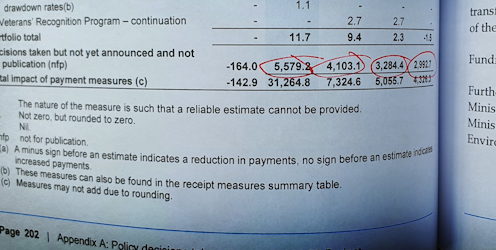$16 billion of the MYEFO budget update is 'decisions taken but not yet announced'. Why budget for the unannounced?
- Written by John Hawkins, Senior Lecturer, Canberra School of Politics, Economics and Society and NATSEM, University of Canberra

One of the most fascinating elements of Thursday’s Mid-Year Economic and Fiscal Outlook[1] is the one we cannot see clearly.
Included in the MYEFO budget update are A$16 billion[2] (over four years) of spending “decisions taken but not yet announced and not for publication”.
These refer to measures to which the cabinet has agreed but about which we will only be told later (and also to things that are not for publication because they relate to commercial contracts and the such.)
Like the wrapped presents under the Christmas tree, we can see there is something there for us, but we can only guess as to what it is.
Why do they do this?
So why doesn’t the government not wait until the budget in March? The decisions and their costs could be announced together then.
Firstly, it is because the government might want to keep open the option of holding the election in March, announcing the spending during the campaign in January and February.
Read more: Fydenberg's MYEFO Budget update shows big election war chest[3]
The problem this would create comes from the Charter of Budget Honesty[4] enacted by the Howard government.
This requires the heads of treasury and the department of finance to sign off on updated budget forecasts in a Pre-election Economic and Fiscal Outlook[5] within 10 days of the issue of the writs for an election.
Importantly, and unusually, they are required to do this in their personal capacities, rather than as servants of their political masters.
Speaking with their own voice in 2016, departmental heads John Fraser and Jane Halton embarrassed[6] their political masters by warning that “without considerable effort to reduce spending growth, it will not be possible to run underlying cash surpluses, say in the order of 1% of GDP, without tax receipts rising”.
Announcing a blowout in the forecast deficit caused by unbudgeted-for spending would be more embarrassing, and could become an election issue.
And there’s another somewhat cynical media management issue.
The impact on the deficit of the unannounced spending has been announced the week before Christmas, well ahead of the campaign. It’ll pass into history.
By contrast, the details of the new spending will be announced in the spotlight of the budget or the campaign, already “paid for”.
How big compared to previous years?
The Parliamentary Budget Office released a report[7] on this matter last week.
Its figures suggest the $16 billion of unannounced spending revealed this year is a record. The previous record was the almost $12 billion in the December 2018 MYEFO, also – not at all coincidentally – just before an election.
It is understood that some of the $16 billion relates to contracts and provisions for payments. Among the likely candidates are vaccine and submarine contracts.
Read more: That reverse mortgage scheme the government is about to re-announce, how does it work?[8]
One part of the package some will be keen to find out about is the measures promised in secret agreement with the Nationals to gain their acquiescence[9] to the net zero by 2050 greenhouse gas emissions target.
Another will be “sweeteners” for electorates the government is hoping to win or hang on to. These will include traditional bellwethers[10] such as Eden-Monaro[11], Lindsay[12] and Robertson[13] and also the seats under challenge from “voices of[14]” independents.
It isn’t certain the billions flagged are the extent of the generosity, but it is likely to be within the ballpark.
References
- ^ Mid-Year Economic and Fiscal Outlook (budget.gov.au)
- ^ A$16 billion (theconversation.com)
- ^ Fydenberg's MYEFO Budget update shows big election war chest (theconversation.com)
- ^ Charter of Budget Honesty (www.legislation.gov.au)
- ^ Pre-election Economic and Fiscal Outlook (www.finance.gov.au)
- ^ embarrassed (www.theage.com.au)
- ^ report (www.aph.gov.au)
- ^ That reverse mortgage scheme the government is about to re-announce, how does it work? (theconversation.com)
- ^ acquiescence (theconversation.com)
- ^ bellwethers (www.abc.net.au)
- ^ Eden-Monaro (www.abc.net.au)
- ^ Lindsay (www.abc.net.au)
- ^ Robertson (www.abc.net.au)
- ^ voices of (theconversation.com)
Authors: John Hawkins, Senior Lecturer, Canberra School of Politics, Economics and Society and NATSEM, University of Canberra







